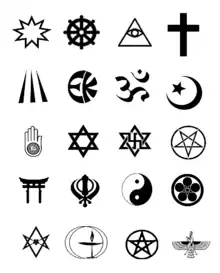Interspirituality, also known as interspiritual, is an interfaith concept where a diversity of spiritual practices are embraced for common respect for the individual and shared aspects across a variety of spiritual paths.
History

Interspirituality originates in the work of Wayne Teasdale, who developed this term to reflect commonalities between religious traditions, specifically those that are spiritual in nature.[1] These commonalities across religious practices do not erase differences in beliefs, rather they build community and sharing across practices, leading to the ultimate goal of more human responsibility to one another and the planet as a whole.[2][3] At its core, this is an "assimilation of insights, values, and spiritual practices" drawn from many different traditions that can be applied to one's own life to further personal, spiritual development.[4]
Critique
While interspirituality is involved with common spiritual practices, these are not synonymous with how religious traditions practice. As such, interspirituality should not be considered synonymous with interfaith work, in part because some spiritual practices may be considered antithetic to certain religious practice, thereby including elements that would not be accepted by some conservative approaches.[5] New insights that can be gained through aspects of other spiritual practices can be threatening to some faiths, as postmodern approaches to beliefs and practices can be challenging when individuals are encouraged to explore other practices to deepen one's own.[6]
Interspiritual meditation
One way interspirituality is practiced is through interspiritual meditation. This was originally developed by Edward Bastian from the Snowmass Conferences convened by Thomas Keating,[7] who organized gatherings of people from other spiritual practices, including the Dalai Lama.[8] Through these gatherings, interspiritual meditation grew to incorporate insights in meditative and contemplative practices across many spiritual traditions, primarily through engaging in shared spiritual practices and then discussing them, rather than through lectures or formal teachings about them.[9] These practices continued to develop and expand beyond Keating's death.[10][11]
See also
References
- ↑ "How to be an urban mystic: The editors interview Wayne Teasdale". U.S. Catholic. 68: 26–30. 2003.
- ↑ Teasdale, Wayne (1999). The mystic heart : discovering a universal spirituality in the world's religions. Novato, Calif: New World Library. ISBN 1-57731-316-X. OCLC 47009676.
- ↑ Kourie, Celia (2011). "Crossing Boundaries: The Way of Interspirituality". Religion and Theology. 18 (1–2): 10–31. doi:10.1163/157430111X613647. ISSN 1023-0807.
- ↑ Teasdale, Wayne (1996). "The Interspiritual Age: Global Spirituality in the Third Millennium". The Community of Religions: Voices and Images of the Parliament of the World's Religions. Bloomsbury Academic. p. 209.
- ↑ Puett, Tiffany (2005). "ON TRANSFORMING OUR WORLD: Critical Pedagogy for Interfaith Education". CrossCurrents. 55 (2): 264–273. ISSN 0011-1953. JSTOR 24460809.
- ↑ King, Ursula (2012), Sugirtharajah, Sharada (ed.), "Interfaith Spirituality or Interspirituality? A New Phenomenon in a Postmodern World", Religious Pluralism and the Modern World, London: Palgrave Macmillan UK, pp. 107–120, doi:10.1057/9780230360136_9, ISBN 978-1-349-33386-8, retrieved 2021-12-08
- ↑ "Introducing InterSpiritual Meditation". The Interfaith Observer. October 15, 2013.
- ↑ Seelye, Katharine Q. (2018-10-28). "Rev. Thomas Keating, Pioneer in Contemplative Movement, Dies at 95". The New York Times. ISSN 0362-4331. Retrieved 2021-12-09.
- ↑ Travers, Andrew. "How Thomas Keating launched a global interfaith movement from a Snowmass monastery". www.aspentimes.com. Retrieved 2021-12-09.
- ↑ Aspen, Todd Hartley. "Celebrating the contemplative legacy of Father Thomas Keating". Aspen Daily News. Retrieved 2021-12-09.
- ↑ Bastian, Edward (February 6, 2017). "Find Your Path". Spirituality+Health.